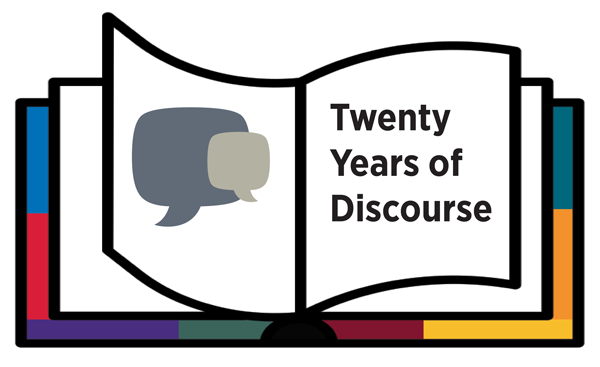
This year marked the 20th anniversary of Claremont Discourse, the library’s signature lecture series featuring Claremont Colleges faculty. Claremont Discourse presented six lectures and panels this year under the themes of “The Changing Landscape of Media” (Fall 2017) and “Engaging Collections at The Claremont Colleges Library” (Spring 2018)
Tuesday, September 26, 2017
Featuring Faculty:
Mark Golub (Scripps College, Associate Professor of Politics)
Lily Geismer (Claremont McKenna College, Associate Professor of History)
Jean Schroedel (Claremont Graduate University, Professor of Political Science)
Moderated by Julie Liss (Scripps College, Professor of History)
Given the current climate in the United States, this year on Constitution Day, we must ask “Is the First Amendment Under Attack?” How should free speech, a guaranteed constitutional right, be defined? Should there be limits on what is protected? A panel of Claremont Colleges faculty met to explore these complex and consequential questions.
Tuesday, October 12, 2017
Presented by Mark Andrejevic
Associate Professor of Media Studies, Pomona College
The paradox of the digital era is that the promise to build a more informed populace has coincided with the rise of false news and the undermining of the efficacy of information itself. This presentation places the rise of false news within the broader context of the rise of digital media. It explores an emerging aesthetic of “framelessness” associated with virtual reality and contemporary forms of surveillance that contribute to the contemporary mistrust of representation.
This mistrust poses a threat to the core principles of democratic deliberation and governance, contributing to the contemporary political crisis. Where we go from here depends on how we understand the underlying issue, which is not just one of polarization and fragmentation, but also a misleading way of thinking about news and information. Resuscitating representation means resisting the fantasy of total information: that we don’t know enough until we know everything.
Wednesday, November 15, 2017
Presented by Gina Lamb
Visiting Assistant Professor of Media Studies, Pomona College
Today’s fast mobile media speeds up our screen life to a 15-minute news cycle, and one-click slacktivism and targeted algorithmic bubblespheres disconnect us from our immediate surroundings. In this context, how do we foster a “slow media” movement, with “glocalized” impact, that utilizes participatory media production as a conduit to spark dialogue directly with our neighbors? Hyper-local and culturally specific productions bring surrounding urbanscapes into new focus, shifting existing relationships by challenging hegemonic corporate media sources that distort, or more often simply ignore, the stories and visibility of entire communities. In this lecture, Prof. Lamb will share example clips highlighting 15 years of collaborative media projects with local community and students.
Thursday, February 8, 2018
In this panel four Asian Studies faculty members will discuss some special items from the exhibition “Text and Image: East Asian Rare Books and Art Works at The Claremont Colleges.” Panelists will consider the research and teaching values of such resources, brief biographies of major Asian collectors, and a brief overview of the Chinese traditional multi-color woodblock printing and its global impact.
Featuring Faculty:
Zhiru Ng (Pomona College, Religious Studies);
Feng Xiao (Pomona College, Asian Languages and Literatures);
Allan Barr (Pomona College, Asian Languages and Literatures);
Bruce Coats (Scripps College, Art History).
Thursday, March 22, 2018
Presented by Daniel Michon
Religious Studies, Claremont McKenna College
Archaeological sites are characteristically imbued with a multiplicity of meanings contingent on the specificities of the society, time, space, and affordances of the representational medium through which these places are perceived. Using the ancient settlement of Sirkap as a case study, Professor Michon will try to demonstrate that thinking about theories of space and place encourages us to experiment with various representational media. This experimentation can result in alternative interpretations of archaeological records as represented in John Hubert Marshall’s Taxila: An Illustrated Account of Archaeological Excavations Carried Out at Taxila under the Orders of the Government of India between the Years 1913 and 1934.
Wednesday, April 25, 2018
Presented by Brent Armendinger
English & World Literature / Creative Writing, Pitzer College
In this talk, Professor Brent Armendinger will discuss the political potential in contemporary poems that take the form of letters. Is there something political about correspondence itself, about its emphasis on relation and exchange, and what happens when poetry enters into this? What difference does it make when the addressee is a person or a group of people, alive or dead, real or fictional, human or not human? To approach these questions, Professor Armendinger will discuss the work of selected contemporary poets and reflect on his own writing practice.